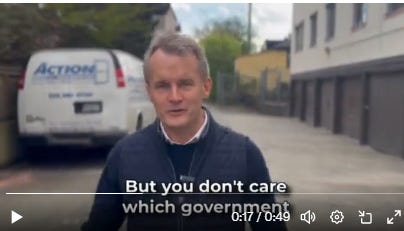“You don’t care which government does what…” —Seamus O’Regan
The government Justin Trudeau heads, even following the support of the New Democrats, has been in a cycle of crises to fix things they break or make worse. Most of these crises are born out of neglect and incompetence, compounded by consistent attempts to cover up the blunders.
Who does what, when, and how matters significantly for accountable, responsible government.

Undeniably, the Trudeau government is constantly making promises and announcements at an impressive pace. If the effectiveness of governing was solely judged based on these announcements, Justin Trudeau and his cabinet would undoubtedly be ranked as the most successful government in Canadian history.
The government is quite good at making announcements and promises. You can often see this in their press releases, conferences, and even social media platforms such as Twitter. However, they seem to struggle with fulfilling their promises and turning them into a reality. Trudeau often announces initiatives without following through on them, leading to unfulfilled promises. Deadlines are often missed, and when they do deliver, it’s often not on time. A prime example is the current shortage of judges, a topic I’ll return to in the upcoming posts.
Housing is one of the best examples. Despite promising in 2014-2015 to deal with housing and homelessness, the Liberal Party has failed to deliver. Their failure has turned the fast-growing need into a housing crisis, with prices soaring and many Canadians unable to afford a home. The government’s attempts to appear effective and their refusal to recognise this failure shows a broader pattern of avoiding accountability.
In 2014 Justin Trudeau started to talk about bringing solutions to housing problems in Canada, blaming the then government in office for not delivering sufficient solutions to the problem. In 2015, Trudeau’s Liberal Party put housing at the forefront of their election platform and promised to invest in a comprehensive National Housing Strategy. The Liberal Party pledged to prioritize affordable housing and senior facilities, build more new housing units, and refurbish existing ones. Despite these promises, Canada’s housing crisis has worsened, skyrocketing home prices and rental rates increasing. Their governing coalition partners readily admit it: The government’s promise to remove 500,000 families from housing needs by 2020 has not been fulfilled. Like many 2015 promises, housing promises fell behind unceremoniously.
At least the promise to deliver a new electoral system had to be confronted, and Trudeau admitted that he was not going to fulfil it. But his housing promises were ignored and nearly forgotten. Nine years later, the housing situation in the country is, as Trudeau now readily admits, a crisis. By 2021, the National Housing Strategy, launched in 2017, had only achieved 13% of its goal to create 150,000 new housing units. The Parliamentary Budget Officer reported in 2019 that the National Housing Strategy provided less funding than the average spent on housing between 2000-2015. The promised removal of GST on new capital investments in affordable rental housing, took 8 years to implement. Having made affordable housing a priority, Canada’s house price-to-income ratio increased from 3.9 in 2015 to 5.9 in 2020.
The Official Opposition party picked up the issue and has inflicted serious damage to the government’s popularity. But the government’s troubles are primarily self-inflicted. They have contributed to the crisis through monetary policy, lack of planning, inability to follow through, and the large surges of immigration, refugees and foreign students that they have allowed into the country without regard for the pressures on housing that their numbers bring.
Put simply, there aren’t enough dwellings and not enough dwellings being built to accommodate the influx of legal and illegal newcomers. For years, you might recall, Ottawa did nothing to plug the torrential influx of illegal immigrants coming in through Roxham Road. The Canada Mortgage and Housing Corporation’s 2020 report showed that the number of Canadians in housing need increased by 9% between 2017 and 2018 and still the government saw no urgency to pick up the pace on housing. Until very recently, their response was to accuse of racism anyone who pointed out the gap and the need to correct it by plugging the torrent coming in. The name-calling strategy was echoed by CBC and the regime media in general.
It is only in the last couple of months that the Liberals have switched gears, paying attention to housing. Just last Fall, some of you might recall, Justin washed his hands off the “crisis” when he pointed out that housing is not a primary federal responsibility. This is true, of course, but he never bothered pointing that out until attention shifted to housing troubles and his unfulfilled promises of a “national strategy” on housing. Suddenly mentioning that the provinces are largely responsible for housing was Justin doing what Justin does best, running away from assuming responsibility and blaming anyone else.
Lack of accountability has been the more important byproduct of Trudeau’s inclination to flee responsibility. A stable pattern links the lack of fulfilment with a lack of accountability.
Their lack of timely delivery and lack of action puts the government in crisis mode. And because the lack of effective action spreads, it leaves the government hopping from crisis to crisis. Some are minor crises and some are larger crises that spill onto the public view. Mostly, they mismanage each crisis.
To read the rest of this column and to access the Institute’s research, please subscribe to our Substack here.


Share Your Thoughts